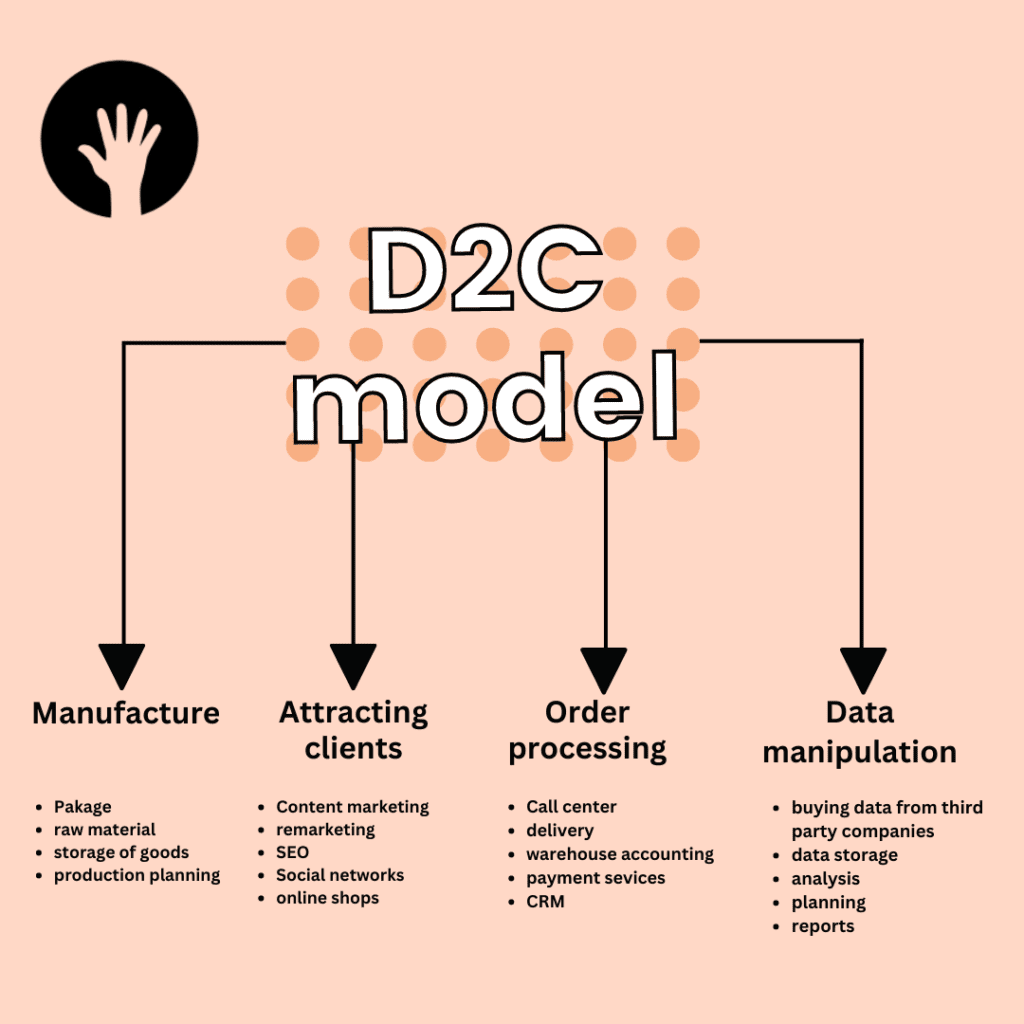
Direct-to-Consumer (D2C) business models have become increasingly popular in recent years. D2C Business Model has allowed businesses to connect with their customers directly, eliminating the need for middlemen or third-party organizations. This has enabled businesses to reduce costs, improve customer service, and gain better insights into customer preferences and buying behavior. It has also enabled businesses to create more personalized experiences for their customers, tailored to their individual needs and preferences.
This business model has revolutionized the way consumers buy products. This approach allows businesses to cut out the middleman and go directly to the customer, providing them with unique products and experiences. This business can provide customers with detailed product information, customizability, and personalized customer service, improving the overall customer experience. Additionally, this model allows companies to use data from customers to improve their product offerings, making the product better tailored to the needs of the customer.
D2C Business Model is becoming increasingly prominent in the business world. This innovative approach to marketing and selling products allows companies to interact directly with their customers and more flexibly manage their operations. By removing intermediaries like retailers, companies can gain greater control over how their products are presented and offer more personalization to their customers. Additionally, the D2C model empowers businesses to capture and analyze a wealth of customer data
This business model has become increasingly popular in recent years. It offers customers a streamlined, efficient way to purchase products and services directly from the companies that make and/or sell them. This model cuts out middlemen and allows companies to have direct relationships with their customers, which can lead to higher customer satisfaction and loyalty. This business model also offers companies advantages in terms of cost savings, since they don’t have to pay fees to third-party vendors.
This model has revolutionized the way companies interact with their customers. Companies like Amazon, Apple, and Netflix have set the standard for this new way of doing business. Instead of relying on third-party retailers, companies can now directly engage with consumers, giving them access to more personalized product offerings and services. This ability to have direct access to customers has enabled companies to develop more sophisticated strategies and target their marketing efforts more strategically.
Companies can respond quickly to customer inquiries or complaints, allowing them to improve their products and services. Additionally, they can provide personalized customer experiences, such as tailored product recommendations or discounts. This has enabled companies to build stronger customer relationships, resulting in loyalty and repeat purchases.
Additionally, this model has helped companies create new revenue streams by creating subscription-based services and launching their own e-commerce stores. By building direct relationships with their customers, companies can collect valuable data about their buying habits and preferences, which they can use to develop more tailored marketing campaigns. Furthermore, customers can make purchases more quickly and efficiently through the direct-to-consumer model, as there is no need to visit a physical store or wait for a third-party retailer to ship the product. Ultimately, this model has enabled companies to better understand their customers and offer them more personalized experiences.
This new model of direct-to-consumer (D2C) business is also greatly beneficial to consumers. With D2C, customers can benefit from better prices, faster delivery times, and more personalized services. Companies are also able to offer more customized products and services that cater to the individual needs of their customers. As a result, customers have greater control over their purchasing decisions and can make more informed decisions.
D2C Business Models have also allowed companies to build better relationships with their customers by providing them with more personalized service and support. Companies can offer more customized products that are tailored to their customer’s needs and preferences. Additionally, companies can offer more competitive prices since they don’t have to pay fees to third-party vendors. With direct access to customers, companies can also provide faster and more reliable customer service, as well as more in-depth product knowledge.
In addition to increasing customer satisfaction and loyalty, the direct-to-consumer model also helps companies build relationships with customers that can last for years. Through this model, companies can offer personalized, tailored experiences that cater to the specific needs of their customers. This helps them stay competitive and keep customers coming back for more. Additionally, companies can gain valuable insights into customer behavior and preferences, which can help them craft even more effective marketing campaigns.
This model allows companies to better understand their customers and build relationships with them over time. This model eliminates the need for middlemen and provides customers with an enhanced experience. Furthermore, this model allows companies to develop a competitive advantage by customizing their products and services to meet their customers’ needs. As such, this model helps companies stay competitive and build long-term relationships with their customers.
Through the direct-to-consumer model, companies can create a more intimate connection with their customers. This connection can be leveraged to provide insights into customer needs and preferences, allowing companies to make better decisions and create more effective marketing strategies. Additionally, companies can create a more streamlined purchasing experience, which helps to drive customer loyalty and increases the chance of customer retention. By keeping customers engaged, companies can build long-term relationships with their customers and ensure their success.
By providing more personalized experiences and more competitive prices, companies that use the direct-to-consumer model can gain a significant advantage over those that do not. This model allows them to build more profitable, long-term relationships with their customers and maximize the potential of their products and services. In addition, companies can gain valuable insights into customer behavior and preferences that can help them refine their strategies and stay ahead of the competition. Overall, the direct-to-consumer model is an effective way for companies to stay competitive and drive their business forward.
By leveraging the direct-to-consumer model, companies can also create better relationships with suppliers and vendors. With direct access to customers, companies can quickly identify potential partners and build long-term partnerships that are beneficial to both parties. This helps them secure better prices, more reliable services, and more innovative products. Ultimately, this helps companies increase their market share and give them a competitive edge.
By using the direct-to-consumer model, companies can better understand their customer base and build long-term relationships. This model allows companies to provide more personalization and customization, while at the same time reducing costs and improving customer service. Additionally, companies can gain valuable insights into their customers’ behavior, preferences, and needs. All of these elements make the direct-to-consumer model an attractive option for businesses looking to maximize their customer relationships and increase profitability.

